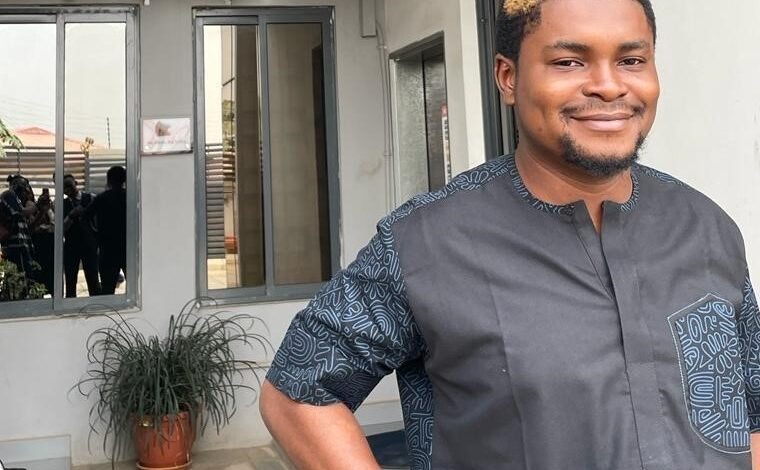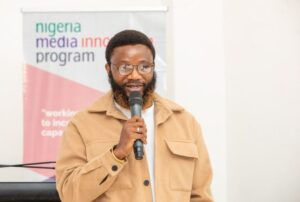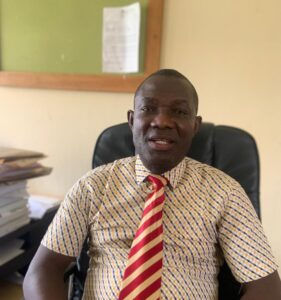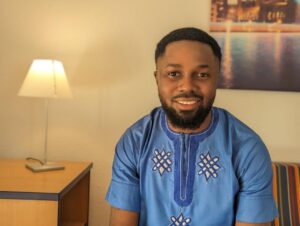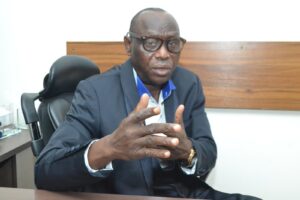Winner of the 2023 Michael Elliott Award for Excellence in African Storytelling, Kunle Adebajo of HumAngle in this interview speaks with Noah Aderoju on winning the prestigious award, his work as a conflict journalist telling the stories of the victims of terror attacks and crisis victims in Nigeria.
He offers suggestions on how journalists and media organisations in the country can excel based on best practices, what should be done by the Nigerian government authorities to mitigate the various crisis in the country and how the media and government can collaborate for more impact.
You have been winning awards and prizes for your essays, columns and journalism works even from your undergraduate years, however, based on your tweet about this 2023 Michael Elliott Award for Excellence in African Storytelling, it seems the award is very special to you. How exactly do you feel about being a winner of this award?
I felt really wonderful winning the award because I have looked forward to it for a really long time. It is one of those awards that I came to know about very early in my career. As I mentioned in my tweet, I read Abubakar Adam Ibrahim’s article that was published in Granta Magazine in which he interviewed a displaced woman, and wrote about his process of trying to get access to an IDP Camp in Borno State, how frustrating it was and he couldn’t go through a formal process of getting permission from the camp officials and all that, and his narrative style was powerful.
For me, that is what the award signifies because it is not just a journalism award, it is an award for storytelling about issues in Africa. And I think I can be like that because one reason I was particularly excited about winning the Wole Soyinka Award for Investigative Journalism in 2021 was also because of the influence and power that the name Wole Soyinka carries and what it connotes in terms of literary genius and fame. So in the same vein in this award, I was really quite happy with the target and focus of the award which is storytelling because I consider myself not just a journalist but also a storyteller so it feels wonderful to be validated in that sense.
You won this award with your conflict journalism piece on the plight of the rescued Chibok girls who were victims of the acclaimed deadliest terrorist group, not only in Nigeria but in the whole of West Africa, Boko Haram, vividly telling how they still suffer even when they are no longer in the hands of terrorists. What informed your writing of the story?
We have been writing about the Chibok Girls since the establishment of HumAngle in 2020. One of the first stories I did was during the anniversary of their abduction in April 2020 looking at the issue of the lack of transparency on the part of the government which was not releasing information to the parents of some of the children who had died in captivity and how this was preventing them from truly healing from the trauma and living functional lives, how it’s also been underreported and how the dangers some of them had face during abduction had claimed their lives in different circumstances.
It is an assignment I took thanks to the support and suggestion of my boss Ahmad Salkida and we have done several stories looking at this issue because it is something we consider really important. Terrorist attacks on schools and the effects this has had on not just the students who are the direct victims of those attacks, but the educational system as a whole. So we thought it was really important to revisit those issues and look at how those tragic events have affected the lives of those students following the attacks. It is also because we realized that many of those students did not return to school or they returned and then dropped out of school for many reasons; because the terrorist threatened to attack them again and kill them if they find them in schools, because of the emotional and psychological trauma that they have gone through as a result of the attack and it is quite significant and also symbolic.
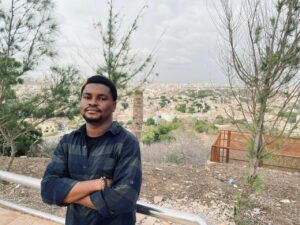
The fight between terrorism and the state is also like the fight between light and darkness. Fight between knowledge and ignorance especially because these terrorist groups claim that education is not permissible. It’s haram in the religion and so if the state is fighting them, it must not only fight them with guns and artillery but must fight this anti-literacy ideology, this war against the schooling system and education. So, the government must not only try to protect the children from guns or getting abducted, but it must also protect the sanctity of the school’s walls and ensure that if it rescues people who have been abducted that they get the most decent quality education available even if it just to get back at the terrorists, but also it has the benefit of inspiring people to see that the government has their back and that there are gains to gaining quality formal education. That was the inspiration behind the story, like the other in-depth stories we have done, on the Dapchi Girls, the Buniyadi massacre, the Birnin Yauri School Kidnapping and some others.
How do you go about writing your reports to make them compelling reads and award-winning stories?
When it comes to writing, I think the more you write the better you get and it also helps to always put yourselves in the mind of the reader. So, when you are writing you are not only writing from your perspectives, you are trying to read it from the perspective of the readers and trying to see if they enjoy reading it. You need to also balance this with a flair for adventure and creativity. A flair for eccentricity and at the same time is not too self-conceited in your approach such that you only think about only your interest, your preferences and your taste and not what the other person thinks. In this particular instance, I also had the advantage of time.
I went to the field over three weeks before the deal date which was the anniversary day of April 14, so it gave me enough time to really work on the story. And it also helps for me that I transcribed my interviews myself, so I am on the field myself, get to see and feel everything from the facial expression to the tone, the environment and also get to ask follow-up questions. While transcribing I get to immerse myself in that interview process again and that really helps.
You can’t really say that a story is an award-winning story. I guess people say that to compliment someone’s writing, ‘Oh my God this is a potential award-winning story’ but it is not something that you can really predict. I have seen many great stories not winning awards and I have seen not-so-great stories win awards. But, there are people who have the formula to win an award. They know the category they are looking for, and they know the approach that they want, but I think people should also try to enjoy the task of storytelling and pursue the story that they are passionate about and if it happens that those stories eventually win an award, then it will be an icing on the cake and not going to be the thing that makes the experience worth it.
So in this story, I invested a lot in how it is presented. You would see the use of illustrations because you couldn’t use the girls’ pictures because they were speaking anonymously and they don’t want to sabotage their scholarship. So, you could see the use of cartoon illustrations to paint pictures of different parts of their experiences. You could see the use of sound bites for some of the powerful quotes that we got from the girls and how these were accompanied by cartoon avatars. We are also very particular about how stories appear on our websites and it is something we will continue to work on to ensure that our reader’s experience is holistically amazing.
As the investigations editor of HumAngle, a conflict journalism media outfit, you are at the epicentre of information dissemination about attacks, victims’ travails, insufficient aid, protracted interventions and many other issues. What is it like, professional, personal life and mental health-wise for you?
I think I have actually done a good job of separating my professional and personal lives. Though my work as a journalist constitutes a chunk of my persona, I try not to let the things I write about overwhelm me. I think it is also because one of my coping mechanisms is not to over-consume information. I do not obsessively read about the development in politics, but I read a lot when researching particular stories. Although I might not be in the right position to say, I think I am handling my work-life balance well and I hope it will remain that way for a long time.
What is your view about the government’s attitude and actions towards countering terrorism in Nigeria?
The government can certainly do a better job in countering terrorism and it has not done a good job so far considering how the terror has spread. Of course, they have made progress, especially during the late days of Goodluck Jonathan and the early days of Muhammadu Buhari, being able to take back the territories that Boko Haram had captured in the Northeast. But when you look at development since then, look at what is going on in the northwest and the north-central regions, look at what is going on in the southeast we realise that a lot of lessons should have been learnt from the poor handling of the Boko Haram crisis are not manifesting in how the government handled the subsequent conflicts and there is a huge deficiency in political will too.
Even with the military approach and all you will realize that there is a lot of lack of transparency and accountability in how money is spent and how soldiers are deployed and there is the problem of the existence of people who are still benefiting from the protracted nature of the crisis. Until we make sure that this is reduced to the barest minimum it will be difficult to achieve long-lasting gains against the insurgencies that are bedevilling the nation.
The government also need to realize that to really tackle this problem, it also needs to pay attention to the non-military approaches of improving human development, improving access to quality and affordable education and also trying to improve people’s understanding of religions in ways that are civil, in ways that are tolerable of differences and that are open to dissenting opinions and ways that are tolerable to critical thinking. The government also needs to make sure that it improves the economies of small societies, especially in places that are not particularly receiving the dividends of democracy.
The government needs to reinforce not just the military, but the policing structure and ensure that it has an effective surveillance and intelligence gathering system that is not just reacting when a crisis erupts but is able to prevent it from happening in the first place through proactive response to emergencies and potential disaster.
What impacts have you recorded with your stories and which would you say is the most impactful so far?
Impact is not something I have thought about a lot in my career as a journalist, but it is something that is keeping me awake at night these days because I have always felt that it is not the journalists’ job to drive impact or to ensure that stories achieve real-life results. Advocates, activities, and civil society organizations should be able to take the baton from journalists once the stories are out, but now I realise that journalists can actually do more than they typically do. And yes, I have the good fortune of some of my stories getting results that are known to me, but I think by far the greatest would be the release of over a thousand people who were detained in military facilities and custodial centres, wrongfully detained for many years in connection with the Boko Haram insurgencies.
This happened in July 2021, months after we started a project that looked at transitional justice in the northeast, which advocated for people wrongfully incarcerated in the region and that was the largest batch of releases since the insurgency started. We really think that it had to do with our consistent reporting on the issue which no other newsroom has matched and it is something that we a really proud of at Humangle.
As a fellow Nigerian and journalist who has seen in close proximity the adverse effect of terror attacks and various conflicts in the country, what would be your advice to the government and citizens?
My advice to the government is to wake up, “Wake Up to your responsibilities”. The true measure of a society’s development and decency is how it treats the most vulnerable of its people and some of the most vulnerable people are the people who have lost everything, were displaced, lost their livelihoods, depend on handouts and aid from donors, humanitarian organizations for their daily survival. People who depend on strangers in host communities for shelter for income for alms and treat these people unfairly tell a lot about their morality as a country. And the government should stop pretending like the problem does not exist. They should understand the problem from the perspective of the victims. Do not rely on middlemen, do not rely on consultants, go to the fields the camps, the communities and listen to the victims and what they want and try to meet their demands as much as they can.
The government should go to the root of the problem and understand that many of these people are just trying to survive. Some of the policies that the government implement sometimes show that there is a very large gap in understanding between the policymakers and those who are supposed to be the beneficiaries of these policies. The recent cash scarcity, for example, you will find that there was a time the Central Bank of Nigeria’s Twitter account made a post suggesting that even people who sell retail goods using wheelbarrows could get POS machines. That means that nothing should stop other business owners from being able to adopt digital banking, but in rural areas, it is not that simple. So the government should make policies that are pro-people at all levels and strata of the societies.
The government should also treat every human life as valuable and react to issues with the urgency that they deserve. The fact that government officials live in well-protected metropolitan areas, have access to bulletproof cars, and private jets, the fact that they have dual citizens and can jet out of the country anytime they wish should not prevent them from doing their jobs as the leaders of the people and from being accountable to the wishes and needs of the people who have elected them. The people who they proclaim to represent in office.
The citizens should also be their brother’s keepers, and help one another. There is a lot of good that can be done if we can pull resources together and support initiatives that will better the lives of vulnerable and underserved people in conflict areas.
How would you describe the relationship between government authorities and conflict journalists like you?
It is the same way various genres of journalism are. You need to be close enough to get information and to share advice and information that you have stumbled across, but you also need to be distant enough to be respected and not to compromise your standard. I just think there should be more collaboration between journalists and government authorities or agencies. There is a lot journalists can learn from the government because journalists too can sometimes be shortsighted in their analysis of issues so the government also needs to let journalists see the challenges it is facing, the plans it is making, and the steps it is taking regarding various issues.
It should educate journalists about the terms they should use when reporting certain things and why the government take certain decisions. And journalists should also work with the government by sharing their findings through multiple means and not just sharing on their platforms because the goal at the end of the day is to get an impact and to trigger change. At the same time, the government also need to encourage critical journalism and not just assume that it is only the people that are assigned to the MDAs or only the people who attend the press briefings that are journalists.
They should also be willing to make clarifications when questions are asked and be more proactive in disseminating information actively. If you have a website make sure it is functioning. If you have a project make sure you are holding yourself accountable to the people by sharing information about the project with the people and if you are asked any question also make sure to be transparent and accountable because everybody benefits from access to information, more accountability and integrity in processes of governance. And with more critical journalism it gets easier to make these things happen the way they ought to happen.
Generally, what is your advice for journalists on how to excel based on the state of the media locally and globally?
The industry is tough, but we need to demand more from ourselves if we want to make more impact and be globally competitive. We have lots of journalists and media organisations in Nigeria. There are countries where you won’t even find up to ten major players in the industry, but you also find that a lot of organizations in Nigeria are not really scaling. They are not becoming regional, not able to constantly commission articles, not able to pay their employees decent wages and it is because we are not pushing ourselves hard enough to become global players.
We are doing great work in investigative journalism, but we can do more because there is a huge gap to be filled in some aspects like data journalism, interactive storytelling, immersive storytelling and others. We also need more strong communal newsrooms that are focused on telling stories at the grassroots. We need more niche newsrooms that are saying ‘Hey these are the things, these are the topics that interest us and we are going to make sure that you get the best of journalism when it comes to these topics’. And we need more collaboration between different media organisations because that is the best way to really make sure that we are able to birth the best products and we are able to trigger the greatest amount of impact.
So, I think journalists in Nigeria should do a lot more research about what is really going on in other parts of the world and aspire not just to do the standards but beyond those standards. We have the skills, we have the brains we have the talents, and there is nothing stopping us, we just need the aspiration and the hard work.
READ ALSO: ‘How to rescue journalism’
